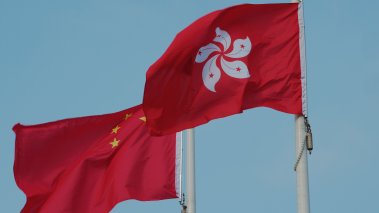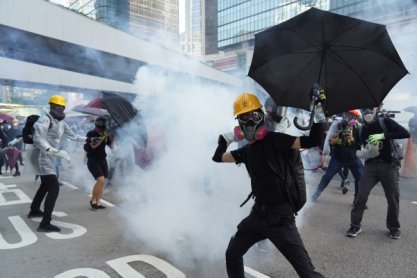Table of Contents
The future of student journalism is at risk in Hong Kong

At FIRE, advocacy for student journalism is a core component of our work. Just last week we wrote in defense of student Jared Nally, who was threatened with disciplinary action by Haskell Indian Nations University President Ronald Graham simply for practicing journalism. HINU is the newest addition to the long list of American universities that have targeted the student press; we discuss these common censorship threats student journalists like Nally often face in last year’s report, “Under Pressure.”

And as The New York Times detailed on Wednesday, student journalists have been providing important, original coverage of the spread of COVID-19 on U.S. college campuses. This is simply further confirmation of what FIRE already knows: Student journalists produce vital work and unique coverage, often shining necessary light on powerful institutions and their communities.
This is true in Hong Kong as well, where recent legal developments have been deeply felt by its resident student journalists, whose work faces increasing threats.
As FIRE explained this summer, the growing restrictions on expression in Hong Kong will have a profound impact not only on its domestic universities, but also on the dozens of U.S. universities with partnerships in Hong Kong. Primary among those restrictions is the National Security Law, passed in late June, which imposes severe consequences on political expression that falls under vague bans on separatism and subversion.
Keith B. Richburg, director of the University of Hong Kong’s Journalism and Media Studies Centre, issued a powerful statement in July in defense of journalism and academic freedom in the aftermath of the National Security Law’s passage. He wrote:
Many have been asking what this means for the future of press freedom, academic freedom and the teaching of journalism. Is there even a future for journalism in Hong Kong?
At the moment, the specifics of the new law are vague, and that vagueness is deliberate. By not spelling out precisely what actions or words count as secession or subversion—by not clearly delineating Beijing’s “red lines”—it gives the authorities the power and leeway to apply the law as they see fit, while forcing everyone into a defensive mode of timidity and self-censorship to avoid possible transgressions. That includes journalists, academics and others in the public space.
We do not intend to do anything differently at JMSC, as we adhere to our mission of training the next generation of reporters and imbuing them with journalism’s international best practices. That means teaching journalism that is fact-based, fair and unbiased, and that gives voice to the voiceless and continues to speak truth to power. The role of journalism is to hold public officials and powerful institutions accountable and to tell stories that need to be told. The biggest danger for press freedom in Hong Kong is if journalists start to self-censor out of fear, and we don’t intend to do that ourselves or teach that to our students.
[ . . . ]
The future of journalism in Hong Kong depends on whether journalists are now going to cower in a defensive crouch, setting “red lines” in their own heads and giving in to the temptation of self-censorship. Or if they carry on, pushing the limits, testing the boundaries with hard-hitting, fact-based and well-documented stories that are beyond refutation.
Until someone tells us otherwise, we are going to continue teaching the latter. We aren’t changing, and we’re not going anywhere.
This message — a refusal to accept self-censorship — should apply not just in Hong Kong, but to student journalists facing challenges in the United States and across the world.
Student journalists facing censorship around the world should look to Hong Kong’s student press for inspiration to stand up for their right to report. Their message: Don’t self-censor. Continue to publish.
Unfortunately, the threats feared by Richburg and press advocates in Hong Kong did not take long to materialize — and student journalists are feeling the pressure. In late September, Hong Kong police “announced a new policy of recognising only media representatives from government-registered or ‘internationally-known’ organisations, excluding freelance and student journalists and newly-launched online media outlets.” The move was reportedly intended to address the rise of “fake journalists.”
According to Mary Hui at Quartz, this change to press credentials “means that journalists who are not recognized under the new rules—freelancers and student reporters in particular—risk being charged with offences like unlawful assembly and rioting, or even crimes like terrorism and subversion under the national security law, when out reporting on a protest.”
Students journalists from schools including City University of Hong Kong and Hong Kong Baptist University released a statement in response to the new police rule on Sept. 23. They wrote:
We, as student journalists from five journalism schools, now strongly condemn the police for suppressing press freedom, people’s rights to be informed, to interview, and to publish.
In the reporting of previous protest confrontations, although there were no clearly stated regulations, student reporters have been holding press passes or HKJA cards, wearing press vests. Yet the police still repeatedly obstructed reporters’ work. Today, the police’s act to unilaterally amend the definition of the press, refusing to accept a student reporter’s identity, will only worsen the situation for reporters' work.
[ . . . ]
We hope media organizations can stand up against the amendment and protect press freedom which we treasure. Although the future is tough, we will keep reporting to serve the community and defend the freedom of the press.
Student journalists facing censorship around the world should look to Hong Kong’s student press for inspiration to stand up for their right to report. Their message: Don’t self-censor. Continue to publish.
Recent Articles
FIRE’s award-winning Newsdesk covers the free speech news you need to stay informed.

BREAKING: New Title IX regulations undermine campus free speech and due process rights


Stanford president and provost cheer free expression in open letter to incoming class
